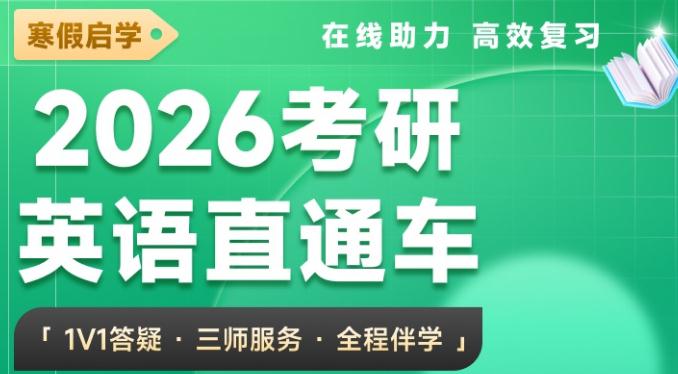1998-2022 ChinaKaoyan.com Network Studio. All Rights Reserved. 滬ICP備12018245號
2014考研英語復習技巧大盤點
題型介紹
研究生英語考試中的翻譯是從一篇400字左右的文章中劃出5個句子,要求考生在30分鐘內將其翻譯成中文,分值10分。考綱上關于翻譯部分的規定是:“能將一般難度的英語短文譯成漢語,理解基本正確,譯文達意。”也就是說,翻譯是一項對考生綜合能力要求比較高的題型,它不僅要求考生對詞匯、語法、語篇以及文化知識等有較好的掌握,還要求考生有很強的語言組織能力。
從近年的考研翻譯真題可以看出,文章的題材大多是有關政治、經濟、文化、教育、科普以及社會生活等方面的內容,文體以議論文為主,說明文為輔,結構嚴謹,邏輯性強。除此之外,長難句較多,這給考生在規定時間內準確地完成翻譯增加了難度。
明確了考研英語翻譯的特點之后,我們有針對性地來談一下翻譯技巧。在此之前,我們必須明確翻譯的標準和過程。
翻譯標準
在我國近現代,最有影響的翻譯標準是嚴復的“信、達、雅”。就考研英語翻譯而言,由于主要是自然科學和社會科學類的文章,加上時間有限,我們無法在“雅”這一標準上做文章。“達”,即通順,譯文必須通順且符合漢語的語言習慣,這是一個重要的評分標準。“信”,即忠于原文,是翻譯的最高標準。由于要翻譯的5個句子是從一篇文章中截取出來的,因而譯文必須和上下文表達的意思一致。如果歪曲了原文的意思,那么該句的得分不得超過0.5分。舉一個非常典型的例子:
The importance of English language incommunication cannot be overestimated。
剛看到這個句子時,很多考生可能馬上會翻譯成:“英語語言在交流中的作用不能被過高估計。”但是,根據上下文來理解,這個翻譯是不對的。事實上,這個英語句子本身就有歧義,有兩種截然相反的理解方式,這時,考生要根據上下文的提示,認識到這個句子應當是講英語的重要性,必須翻譯成:“英語在交流中的重要性,怎么高估也不過分。”所以,翻譯不能扭曲原意,這是考研翻譯的基本標準。我們這里強調的“信”和“達”,實際上也是我國翻譯界普遍認可的標準:即忠實和通順。
翻譯過程
很多學者對翻譯過程都有過著名的表述,比如沃吉林的循序漸進翻譯方法:①逐詞對譯;②整理成符合譯語規范的句子;③刪除多余及不搭配的成分;④增添譯文所需的成分;⑤語言加工。奈達則把翻譯分成三階段:①找核心句;②譯核心句;③由核心句生成譯語表層句。由于考研英語翻譯大部分句型都是長難句,這一過程顯得尤為重要。簡而言之,首先要找出句子的主干部分,然后再處理其余的細枝末節,如修飾成分之類的。考試中,考生應該先略讀全文,從大體上把握文章的意思,然后分析需要翻譯的句子,找出主干,并明確代詞如it、this、that、these等所指代的內容。接著,進一步分析句子在整篇文章中的作用及整體意思,分析完后開始翻譯,使語句盡量通順,并與上下文意思相符合。最后是檢查,看拼寫有無錯誤,時態是否正確,標點符號是否正確,數字、年份有無錯誤,以及有無自己的主觀增減。
翻譯技巧
1.直譯和意譯
所謂直譯,是既忠于原文意思又保留原文形式的翻譯;所謂意譯,是不受原文詞語的限制,不拘泥于原文句子的結構,用不同于原文的表達方式,把原文意思表達出來。在考研英語翻譯中,由于題材基本上是關于自然科學和社會科學的文章,所以我們遵循的方法是:能直譯就直譯,既能直譯又能意譯的以直譯為主,不能直譯的采用意譯,一般情況下直譯與意譯相結合。
(1)能直譯就直譯
例:In dealing with a challenge onsuch a scale, it is no exaggeration to say," United we stand, divided wefall "。(2006年真題)
譯文:在應付一個如此規模的挑戰過程中,我們可以毫不夸張地說,“團結,我們就會站起來;分裂,我們就會倒下去”。
(2)不宜直譯就意譯文章來源:《求學·考研》雜志
例:The talk about raising taxes was ared flag to many voters。
譯文:關于增稅的談論激怒了許多選民。
分析:原文表層信息——關于增稅的談論對選民來說是一面紅旗(紅旗對中文讀者來說象征著革命)。
原文深層信息——a redflag是令人生氣的事物,源于西班牙的斗牛民俗。斗牛場上,人們用紅布來激怒牛。
(3)直譯與意譯相結合
例:The purpose of a test is to showwhat you have learned about a subject. The world won't end if you don't pass atest. So don't worry excessively about a single test。
譯文:考試的目的在于顯示你對某一科目的掌握程度。一次考試不及格天是不會塌下來的。因此不必為一次考試過分擔心。
另外,我們不能忽視詞語詞組的翻譯應以適應上下文為主要標準。例如“work”,在考研翻譯中往往不能翻譯成“工作”,而要翻譯成“研究工作”;作為名詞,也不能翻譯成“作品”,而應當翻譯成“研究成果”。這是考研翻譯的一些具體要求和得分點之所在。文章來源:《求學·考研》雜志
2.增譯
作為翻譯的一個普遍原則,譯者不應該對原文的內容隨意增減。不過,由于英漢兩種語言文字之間存在著巨大差異,在實際翻譯中,為了忠于原文,不能減損意思的表達。例如1994年真題中有這樣一個詞組“greatman of genius”,許多考生翻譯成了“天才”或者“偉人”,只取其一,都被酌情扣分,譯文應是“天才(的)偉人”,這樣才算忠于原文。又如2001年真題中出現的“doll”,不能翻譯成“玩具”,而必須翻譯成“玩具娃娃”才能得分。所以,在考研翻譯中,不妨奉行“只加不減原則”,當然也不要加得太多,把一句簡單的“I can't sleep”翻譯成“長夜漫漫,無心睡眠”就萬萬不可。但是,如果在文中遇到了省略句,那就必須“只加不減”。例如1998年真題出現的這個句子:“It'sthe farthest that the scientists can see into the past。”就必須翻譯成:“這是科學家看到的最遠的過去(的景象)。”又如這句:“Wedon't retreat, we never have and never will。”就翻譯成:“我們不后退,我們從沒有后退過,將來也決不會后退。”所以,為了在保證信息覆蓋率的基礎上,使譯文通順流暢,符合漢語的表達習慣,一般都采用“只加不減”原則。
3.轉譯
在翻譯過程中,由于漢語和英語兩種語言在語法和表達習慣上的差異,有時必須改變原文某些詞語的詞性或句子成分才能有效地傳達原文的準確意思。這就涉及到轉譯法。轉譯法分為兩種:詞性的轉換和句子成分的轉換。
(1)詞性的轉換
例:The growing awareness by millionsof Africans of their extremely poor and backward living conditions has promptedthem to take resolute measures and create new ones。
譯文:數以百萬計的非洲人已逐漸意識到他們的生活狀況異常貧窮落后,這就促使他們采取堅決措施去創造新的生活條件。
分析:原文當中的名詞轉換為譯文中的動詞。
(2)句子成分的轉換
例:Traditionally,legal learning has been viewed in such institutions as the special preserve oflawyers, rather than a necessary part of the intellectual equipment of aneducated person。(2007年真題)
譯文:傳統上,這些院校一直把學習法律看作是律師專有的特權,而不是每一個受過教育的人必備的知識才能。
分析:原文的被動結構式主語變成了譯文中的賓語,符合漢語表達習慣。
4.英語三大從句的譯法
英語的三大從句是:名詞性從句、定語從句、狀語從句。由于它們本身就是句子,放到大的句子中會讓句子變得復雜,從而也增加了翻譯的信息量和難度。
(1)名詞性從句的譯法
名詞性從句通常表達一種具體的概念,如“how things stand”實際上是表達“情況”這一概念,如果直譯為“事物是如何站著的”就不準確,同時也違背了原意。所以通常采用概略法來翻譯,使從句陳述的內容更明確化。
例:While weconverse with what is above us, we do not grow old, but grow young。
譯文:與高于自己的思想進行交流,人不會變得年老,只會變得年輕。
(2)定語從句的譯法
在翻譯英語的定語從句特別是復雜的定語從句時,最基本的方法是把它從整個句子結構中解放出來,即把原文的定語從句從其修飾地位中分離出來,使其相對獨立地敘述所要表達的信息。從結構上分,英語定語從句可以譯為前置定語、并列分句、狀語從句、獨立句子等。在2007年的真題中有這樣一個句子:
On the other, it links these concepts to everyday realities in amanner which is parallel to the links journalists forge on a daily basis asthey cover and comment on the news。
譯文:另一方面,法律以一種方式把這些觀念同日常實際聯系起來——這種方式類似于新聞記者在報道以及評論新聞時根據日常規則所形成的聯系方式。
我們可以看出這個定語從句已從整個句子結構中脫離出來,并用破折號表明。
(3)狀語從句的譯法
英語的狀語從句無論在結構外形上還是內涵表意上都與漢語的狀語從句大致對等,這里只強調幾個應該注意的問題:
①連詞能省則省,只要能把意思說清楚,盡量不使用連詞。
②如果條件或讓步狀語從句在整句中語氣較弱,可以把主句譯在前面,從句譯在后面。
③狀語從句的位置可以靈活變動,以便使譯文更流暢。
另外,不常見的人名、地名可以保留原文。萬一遇到不認識的詞,最好忽略不譯,切忌胡亂翻譯。最后,希望大家學有所成,考研順利!
來源未注明“中國考研網\考研信息網”的資訊、文章等均為轉載,本網站轉載出于傳遞更多信息之目的,并不意味著贊同其觀點或證實其內容的真實性,如涉及版權問題,請聯系本站管理員予以更改或刪除。如其他媒體、網站或個人從本網站下載使用,必須保留本網站注明的"稿件來源",并自負版權等法律責任。
來源注明“中國考研網”的文章,若需轉載請聯系管理員獲得相應許可。
聯系方式:chinakaoyankefu@163.com
- 2026考研英語全程班 寒假班
- 權威高配師資親授技巧,教研千錘百煉科學提分。直錄播課相結合精講互動二合一,專業團隊精細化作文批改。講練結合,隨學隨練穩步提升。支持試聽~
- 主講團隊:王江濤、譚劍波、董仲蠡、許聰杰、陳志超、潘赟、鄭艷彤、易熙人

掃碼關注
了解考研最新消息












